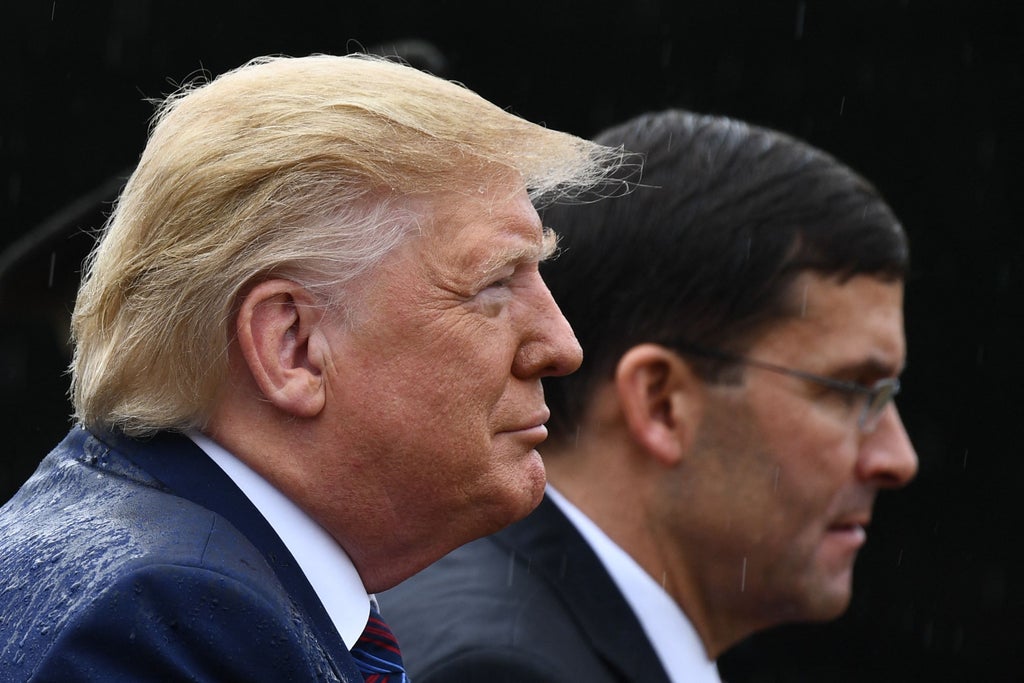
Former Defense Secretary Mark Esper says in a new interview that Mr Trump’s closest military advisers were involved in an effort to thwart Donald Trump’s worst impulses while in office.
The former DoD chief spoke to CBS’s 60 Minutes in a wide-ranging interview filled with shocking claims that if true paint the picture of a chaotic last year of the Trump presidency that nearly saw the US tumble into several new wars.
Speaking with Norah O’Donnell, Mr Esper explained a system he and Pentagon chief Mark Milley devised called the “four No’s”: an effort to prevent politicisation of the military, misuse of the military, so-called “strategic retreats”, and new unnecessary conflicts with foreign powers.
Mr Esper went on to say that in the last year of the Trump presidency, those around the former president were making suggestions that included (but were not limited to): attacking Venezuela, blockading Cuba, striking Iran, and more.
“The last year of the Trump administration … we prevented really bad things, dangerous things ... that could have taken the country in a dark direction,” Mr Esper said, after O’Donnell asked “what kind of terrible things” he had prevented.
The ex-defence chief added that these ideas would surface “every few weeks” and that it was his job (and others’) to “swat them down”.
His comments aligned with comments that Mr Milley himself has made since the Trump presidency ended explaining his fears that the president would order a military strike against China in his final days in office.
The ex-president has gone on the offensive against Mr Esper in recent days, as he has done against so many of his former political allies who have said damaging things about his presidency since leaving.
Mr Trump released a lengthy response to CBS addressing questions from the news outlet about Mr Esper; in it, he painted Mr Esper as a "weak" yes-man desperate to keep his job.
“Mark Esper was weak and totally ineffective, and because of it, I had to run the military. I took out ISIS, Qasem Soleimani, al Baghdadi, rebuilt the military with $2.5 trillion, created Space Force, and so much more. Mark Esper was a stiff who was desperate not to lose his job,” wrote the president.
He also explained his nickname for Mr Esper, “Yesper,” adding: “I fired Yesper because he was a [Republican In Name Only] incapable of leading, and I had to run the military myself.”
He did not address one of the most startling claims from the interview: the idea that the sitting president had suggested launching a missile strike against supposed criminal cartel positions in Mexico, apparently without the consent or even knowledge of Mexico’s government.
“No comment,” the ex-president said in response to that question.
The depictions of the Trump administration, particularly its final year, from former US officials and political staffers have revealed a White House ruled by chaos and a president who became increasingly isolated from his own advisers as the 2020 election concluded and he launched his effort to overturn the results.
Once-close former aides including Stephanie Grisham have turned to speaking out against their ex-boss as he publicly plots a return to the White House in 2024 and appears to be building a massive war chest for that purpose.
With the break of Mr Esper from his former boss’s narrative, Mr Trump now has few former White House staffers left who will publicly defend the final days of his presidency and his conduct in the days surrounding January 6.
He remains the favourite for the 2024 GOP nomination (though he has not officially announced a bid) according to recent polling and also maintains a firm grip on intra-party politics within the Republican Party as evidenced in his recent success at pushing JD Vance over the finish line in Ohio’s Senate primary.







